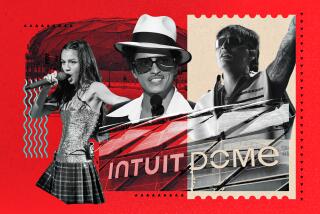Q&A; : The Cutting Edge: Computing / Technology / Innovation : A Scott Cook’s Tour of the Future of Personal Finance
- Share via
SAN FRANCISCO — Scott Cook showed the world that a David like his Intuit Inc. could take on a Goliath like Microsoft Corp. and win handily.
Now, in a decision that stunned many technology watchers, he has thrown his lot in with Microsoft Chairman Bill Gates. Microsoft agreed last week to pay a whopping $1.5 billion in stock to buy Intuit, publisher of the popular Quicken personal finance software. The goal of Gates and Cook is to be the essential software link in the multibillion-dollar personal finance market.
Cook, whose company is based in Menlo Park, Calif., talked about the proposed deal and his vision of a world in which everyone will routinely use electronic media to pay bills, transfer funds, buy stocks and shop for mortgages.
Q. You were whupping Microsoft at the personal finance game. What prompted you to sell?
A. We weren’t looking to sell. But when Bill called me, he had started responding to the things we are trying to do. We want to change for the better the way people manage their financial lives and help them make much better decisions. . . . Now we’re able to do that in many more areas and many more countries.
Q. Gates would put you in charge of electronic commerce, but ultimately you would be answering to him. How will you feel about being No. 2 to your former rival?
A. I guess there are some CEOs who are into a power and control thing. I’m not one. I had no problem bringing in Bill Campbell, and he’s the CEO. I don’t feel I have any divine right on decision making around here. We want the best ideas. Second, Microsoft is a company with a tremendous track record for giving their operating units autonomy. They don’t force all the decisions through some sort of funnel. There are strategy reviews every six months, but other than that he expects you to run the business.
Q. To allay potential antitrust concerns, Microsoft is selling its Money personal finance program to Novell Inc. But the purchase of Intuit would give Microsoft control of 70% of the market. Are you worried that antitrust questions could derail the deal?
A. In fact, there are many competitors. What we basically do is the automation of financial services, and in financial services there are hundreds of companies that are very keenly aware of the role of technology in automating financial affairs. Charles Schwab and Fidelity both have their own software that does things that Quicken does plus allows you to do your own trades. Schwab gives theirs away free. Plus banks, such as Citibank. Visa has just signed up with Managing Your Money (a money management tool). EDS, the huge computer giant, is doing electronic banking for any bank that wants it. This is a wild and woolly free-for-all.
Q. Are you a threat to banks? A Forrester Research survey found that bankers fear that software companies’ services could bypass them.
A. I don’t understand where that’s coming from. No bank has told us that yet. It must come either from banks who are misinformed or uninformed or don’t know what we’re doing. All the banks we’re talking to don’t have feelings like that.
Q. How will you work with banks?
A. We’re not a bank. How can we take money from them? Take NPCI (National Payment Clearinghouse Inc., a service bought by Intuit that bank customers use to tap into accounts and pay bills). They’re not a bank. They serve banks. . . . They link banks and we link banks to their customers.
Q. Describe your vision of electronic financial management.
A. You have to start with the way the world is today. Most people don’t feel very good about the way their financial lives are managed, particularly the way decisions are made about insurance, investing, college, mortgage refinance, that sort of stuff. Twenty-five years ago, there weren’t that many options or decisions. If you went to a bank, they had one flavor of mortgage. Today there’s a plethora of mortgage choices--different rates, negative amortization, positive amortization, different point levels. Today there are 4,000 mutual funds. It’s very confusing. . . . As a result, we’ve got the option to help people make good, sound decisions.
It’s also hard today for financial institutions to have the close relationship with their customers that they’d like. Branch offices aren’t staffed with the kinds of people you can develop a relationship with. We can change that. Not only can we help consumers make much better decisions about their finances, what we’re building will provide financial institutions with a deep and rich, close relationship with their customers. For example, the information on the financial institutions’ complete line of products and services can be available at customers’ fingertips, whenever they want it, 24 hours a day, seven days a week, in the privacy and convenience of their own homes.
When customers want to sign up for something today, you have to send them an application. They have to handwrite the application. There’s a lot of opportunities for customers to forget or become interested in somebody else. In our vision, a person can immediately apply. Another advantage is for self-directed customers, ones who want to make decisions themselves, which increases the convenience and lowers the cost. Richer relationships, lower costs, increased convenience. This is what we are building the technology to do.
Q. What accounts for the extraordinarily high valuation for Intuit?
A. It was a heavily negotiated price, but no surprise. What we’re doing is very big and very important. We’re not the only act in town.
Q. How does it feel to be worth more than $300 million?
A. I put my hose on the same way. The true test is, it doesn’t make any difference to my kids.
Do you have questions or comments for Scott Cook? The Cutting Edge Forum invites your thoughts. Send e-mail to edge@news.latimes.com or faxes to (213) 237-7837 or mail to The Cutting Edge, Business Section, Los Angeles Times, Times Mirror Square, Los Angeles, CA 90053. Scott has agreed to respond to some questions in this space next week. Please include your name and telephone number.
Scott D. Cook
Title: Founder and chairman of Intuit Inc.
Age: 42
Education: Bachelor’s degree from USC, master’s from Harvard Business School. Attended high school in La Canada.
Family: Married to Signe Ostby. has three children.
Hobbies: Bike riding, though a broken collarbone from an outing earlier this year slowed him down.
Computers: 486 Toshiba laptop with a color screen that plugs into docking stations at home and work. The kids have a Macintosh.
More to Read
Inside the business of entertainment
The Wide Shot brings you news, analysis and insights on everything from streaming wars to production — and what it all means for the future.
You may occasionally receive promotional content from the Los Angeles Times.











